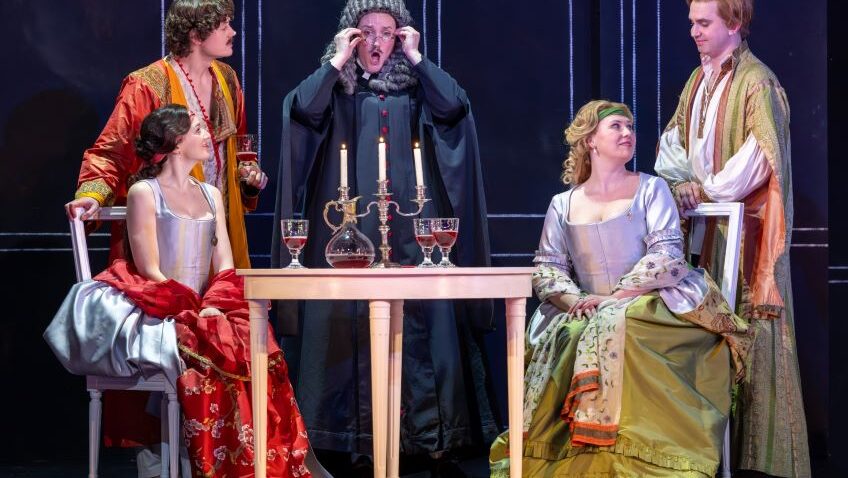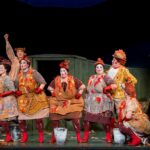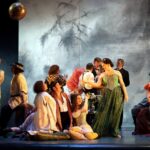This Cosi Fan Tutte is the latest revival of Tim Albery‘s highly successful 2004 production. Lightly tripping along through its supreme silliness, dotted with more intense moments, and all wonderfully interwoven with Mozart’s musical splendour and very fine singing all round, it brings amusement, bemusement and delight.
As with many unlikely plotlines, characters and controversial gender stances in rom-coms, soaps and Carry On films, the audience must suspend its disbelief from the outset. In this implausible story, we meet two young couples, dressed in an elegance of finery from Mozart’s own era – two sisters in big, twin silvery-blue frocks and their beloved young men in smart cream. Both couples, lads and lasses, are soppily besotted with one another, painfully, melodramatically smitten, head-over-heels, over-the-top love-struck.
This being the era of Enlightenment, the Age of Reason, when social and scientific experiment was all the rage for establishing solid truth and facts (or so they thought), along comes older philosopher, Don Alfonso, first in black gown, then in dark frockcoat, waistcoat and trousers, his comely calves in neat, white tights, to conduct an experiment of his own. He makes a bet with the two silly young chaps, Ferrando and Giugliemo, that the two silly young women who are so fervently in love with them, Dorabella and Fiordiligi, will be unfaithful at the drop of a hat – within 24 hours, in fact. He’s convinced all women are fickle and behave exactly the same: Cosi Fan (fanno) Tutte, he claims, and sets out to prove it. (This same simplistic, misogynistic sentiment later sings out in Verdi’s La Donna e Mobile – Qual Piume al Vento).
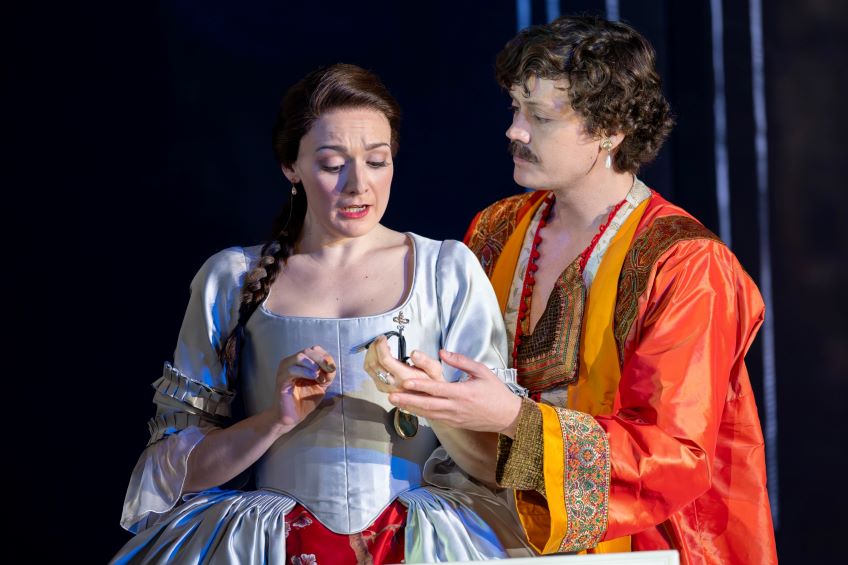
That Don Alfonso is willing to take two sets of sweet-singing lovebirds from heady, blissful paradise and plunge them into misery and despair just to prove a point might well label him as nothing but a dark, heartless, manipulating sadist. But Quirijn de Lang’s lighter touch, together with the fact that the four lovers are so ridiculously silly in spite of moments of anguish, the fact that the men’s disguises as strangers are so unconvincing and the fact that the final outcome is not truly tragic in this unreal drama, allows us to regard it all more as just fun and mischief. Don Alf’s experiment has no legs, anyway: with no control group and a sample of only two, his conclusion, even if all went entirely in his favour, could only ever be cosi fan due, not cosi fan tutte.
Tobias Hoheisel’s set captures this element of experiment brilliantly, as does the minimal character of the props: chairs, table, coffee cups, glasses of wine, candles. During the busy, exhilarating Overture, the fine orchestra nicely guided by Clemens Schuldt, a large camera lens silently stares out at us, about to turn the world upside down. Thereafter, two round lens shapes on the side walls of an otherwise sparse, linear, geometrical set echo this element of recording and observation. Subdued grey walls with handsome white outlines work beautifully with the simple, geometric shapes of white chairs and table while interesting entrances and exits into the experiment’s space are made courtesy of inbuilt, elevator-style doors that open and close as for Kirk and Spock on the Starship Enterprise. These two boxes are handy, too, for the odd bit of comedic posing or for lurking in voyeuristic observation. To reflect the narrow focus of location and action, the walls move dramatically inwards on the characters like a trap.
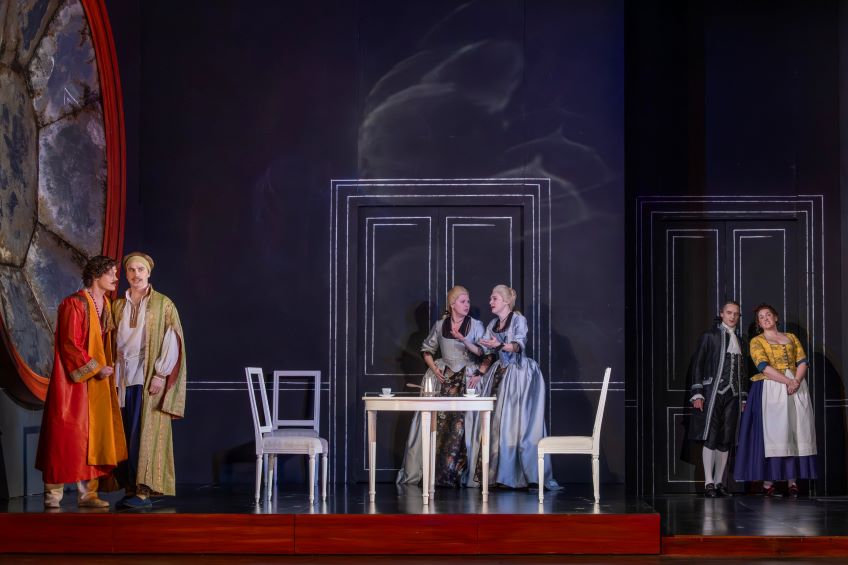
Though our credulity is stretched to (beyond) its limits by the melodramatics, especially when the chaps turn up in unconvincing moustaches and “Albanian” robes from some Biblical epic, posing as strangers that the girls totally fail to recognise when each is unwillingly courted by the other‘s beau, the lads are less moustache-twirling seducers than limp wimps – which adds to the humour. The girls are very far from pushovers, especially Fiordiligi, but once Don Alfonso bribes opportunist maid Despina into being his naughty co-conspirator, the women finally agree to tart up their graceful attire a tad with brighter colour and the situation begins to change for the slightly steamier.
Lively soprano Gillene Butterfield has an assured, engaging stage presence and nice comic timing as Despina. Given a little more context, she’s a bit more of a rounded character than the rest – though deliberately less so when posing as a bogus lawyer or a doctor wielding mighty Mesmer magnets that can, it seems, bring poisoned young men back to vibrating life. The voices of warm, engaging soprano Alexandra Lowe as Fiordiligi who, at times, wrestles seriously with pangs of guilt and conscience and mezzosoprano Heather Lowe as the slightly more frivolous Dorabella (not related in real life) perform beautifully alone and also blend beautifully together, ensuring Mozart’s glorious, honey-rich harmonies and melodious interweaves delight our ears at all times. The same goes for strong, exhilarating tenor Anthony Gregory as Ferrando who shapes his dynamics beautifully and baritone Henry Neill as Guglielmo. Indeed, all six performers’ voices blend most pleasingly together in their various permutations or stand sturdily alone in an opera that’s big on symmetry and balance. All is sung in English with Lorenzo da Ponte’s Italian libretto rendered into succinct, sometimes amusing text, written on screens at either side of the stage.
By the end the lovers are left emotionally battered, bruised, dazed and thoroughly bemused. We’re bemused, too, but also wise enough to see that the men’s behaviour as deceivers is more despicable than the women’s behaviour as the deceived, though Don Alfie didn’t think to put that in his Age of Reason pipe and smoke it. Nevertheless, we’re delighted to have been so wonderfully entertained at his terrible School for Lovers (La Scuola degli Amanti).
Eileen Caiger Gray
After Feb 23rd at Leeds, the show will tour to Nottingham, Newcastle, Salford and Hull. For more information and tickets follow this link.

